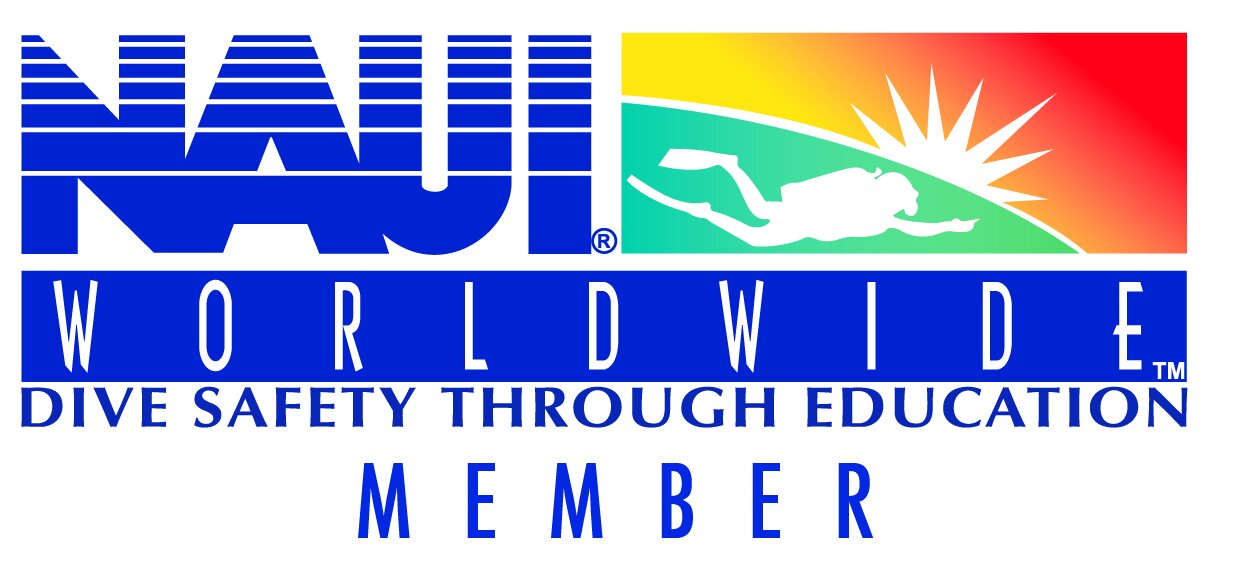
Learn to Dive
Become certified to SCUBA Dive with a NAUI certification
NOTE: Travel to various local dive sites are required for this course. Optionally, possibility of a Florida dive trip will be discussed.
OVERVIEW AND QUALIFICATIONS
This course is a continuing education certification course for certified divers. It is an enjoyable program of continued supervised experience designed to introduce divers to a variety of diving activities and to be taught entirely in an open water setting. Upon successful completion of this course, graduates are considered competent to engage in open water diving activities and the areas dived approximate those of training. This course is appropriate for divers who:
Desire additional training.
Have moved from one diving area to another and desire local orientation.
Do not have, but wish to obtain, NAUI certification.
Desire orientation to a variety of diving sites and conditions.
Prerequisites
Age. Minimum is 15 years by the water phase of the course. (Junior certification for ages 10-14 years is allowed. Talk to one of our instructors on “Policies Applying to All Courses: Age, Junior Certification.”)
Certification/Experience/Knowledge. Certification as a NAUI Open Water Scuba Diver or the equivalent is required. The instructor is to ensure adequate student knowledge and capability before any open water training and shall use skill or other evaluations to do so. One open water dive (which does not count toward the minimum number of dives required for the course) may be used as a screening and evaluation dive. This is not required when the student’s diving proficiencies are well known to the instructor.
Equipment. Students shall furnish and be responsible for the care and maintenance of their own diving equipment. The instructor shall initially assist the student in checking all student gear to ensure it is adequate and in proper working order.
Course Description (minimum of 6 academic hours and a minimum of 6 dives in varying environments)
REQUIREMENTS – ACADEMIC
General
Academics presented during the course orientation, dive briefings and debriefings and eLearning are to be used to enhance the safety, knowledge and appreciation of the dives made.
Whenever possible a variety of sites shall be dived. Students are to prepare and present dive plans for each location and dive purpose. If a limited number of sites are available, the instructor can aid learning by creating varied meaningful dive tasks. Logbook entries shall reflect the specific activities of the dives.
Instructor led dive briefings and debriefings done in conjunction with the open water dives are required. The student divers shall fully participate in the dive planning process.
Subjects and skills of importance for emphasis during briefings and dives include:
Fitness, stress, individual limitations, fatigue, exposure, and diving adaptations.
Rough water, limited visibility, and dive/abort decision making.
Weight use, suit compression compensation, breathing patterns as related to buoyancy control, and descent and ascent control.
Dive planning, equipment preparation and care, and buddy diving. Each diver is to assume a leadership role on at least one dive.
Communication, instrument use, and navigation.
Environmental aspects and diving skills that minimally impact the environment.
Rescues and assists (self and buddy), emergency system and actions are to be reviewed and practiced.
REQUIRED DIVES
Navigation
Night or low visibility diving
Deep diving (40m/130 feet maximum depth)
SOS-ER Requirements
The class sessions (in addition to eLearning) will consist of
2 or more virtual classroom sessions
4 or more confined water sessions (the later sessions may be held at a local quarry). This sessions do not count towards the required open water dives in order to obtain certification.
A Minimum of 6 open water dives with the instructors.
At least 2 dives are to be deeper than 6m (20 ft).
The maximum depth for any open water dive during this course is 40m (130 ft). No dives are to require actual staged decompression.
Provided Gear
We provide buoyancy compensator (BC), regulator sets, cylinders (tanks), and air fills for the course.
Students must provide their own:
Mask, snorkels, fins, dive boots, weight belts, and soft weights (we will assist in where to obtain this gear).
Wetsuit or any other rental gear.
Open water Checkout Dive options:
Local Quarry check out dive fees (usually a daily fee per diver) are not included in the cost of the course.
Open water checkout dive trip to Florida is not included. These cost will vary by season, locations in Florida, economy, and personal preferences of the student.



